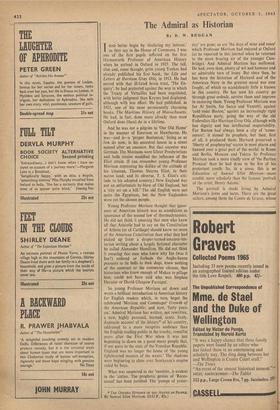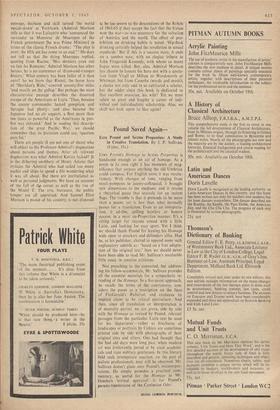The Admiral as Historian
By D. W. BROGAN
IHAD better begin by 'declaring my interest,' as they say in the House of Commons. I was one of the first pupils inflicted on the first Harmsworth Professor of American History when he arrived in Oxford in 1923. The tall, slim and, sonic thought, grim young Yankee had already published his first book, the Life and Letters of Harrison Gray Otis, in 1913. He had served with that ill-fated brain trust, 'The En- quiry'; he had protested against the way in which the Treaty of Versailles had been negotiated, with better judgment than Keynes had displayed, although with less effect. He had published, in 1921, one of his most permanently charming books, The Maritime History of Massachusetts. He had, in fact, done more already than most Oxford dons (then) do in a lifetime.
And he was not a pilgrim to 'Our Old Home' in the manner of Emerson or Hawthorne. He was—and is—a 'proper Bostonian,' living as so few do now, in his ancestral house in a street named after an ancestor. But that ancestor was German. The Morisons were Ulster Presbyterians and both strains modified the influence of the Eliot strain. (I can remember young Professor Morison expressing his dislike of the attitude of his kinsman, Thomas Stearns Eliot, to their native land; and its obverse, T. S. Eliot's atti- tude to his adopted country.) New England was not an unfortunate by-blow of Old England, but a 'city set on a hill.' The old English were not quite the Egyptians, but the New Englanders were yet the chosen people.
Young Professor Morison thought that ignor- ance of American history was as scandalous as ignorance of the second law of thermodynamics. He did not think it amusing that men who knew all that Aristotle had to say on the Constitution of Athens (or of Carthage) should know no more of the American Constitution than what they bad picked up from a draper-turned-amateur-his- torian writing about a largely fictional character he called Alexander Hamilton. He did not think it amusing that men who knew why Inc (was it Ine?) ordered or forbade the Anglo-Saxon peasants to tie bells to their dogs, knew nothing of the contract or the commerce clauses, that historians who knew enough of Mahan to pillage him, could not have said who was Stephen Decatur or David Glasgow Farragut.
So young Professor Morison sat down and wrote a brilliant introduction to American history for English readers which, in turn, begot the celebrated 'Morison and Commager' Growth of the American Republic; and now, 'forty years on,' Admiral Morison has written, not rewritten, a new, highly personal, learned, acute, lively, dogmatic account of the history* of his country, addressed to a more receptive audience than the English reading public in the touchy, resentful years after the First War when it was just beginning to dawn on a good many people that, ir not quite in the state of the Venetian Republic, England was no longer the home of 'the young lighthearted masters of the waves.' The shadows were beginning to close over Santayana's empire ruled by boys.
What was suspected in the 'twenties, is evident in the 'sixties. The prophetic genius of 'Reces- sional' has been justified. The 'pomps of yester-
* THE OXFORD HISTORY OF THE AMERICAN PEOPLE.
By Samuel Eliot Morison. (O.U.P., 82s.)
day' are gone; so are 'the days of wine and roses' which Professor Morison had enjoyed at Oxford (as he reported in this journal when he returned to the more bracing air of the younger Cam- bridge). And Admiral Morison has mellowed. He had, even then, plenty of wit and humour and an admirable turn of irony. But since then, he has been the historian of Harvard and of the American Navy in the greatest naval war ever fought, of which so scandalously little is known in this country. lie has seen his country go through great ordeals, survive them and improve in enduring them. Young Professor Morison was for Al Smith, for Sacco and Vanzetti, against 'cold roast Boston,' against an increasingly rigid Republican party, going the way of the old Federalists like Harrison Gray Otis, although with less dignity and less intellectual respectability. For Boston had always been a city of 'come- outers'; it stoned its prophets, but then, first of all, it produced them. Harvard preserved a 'liberty of prophesying' scarce in most places and banned over a great part of the world; in Rome and Berlin, Moscow and Tokyo. So Professor Morison took a more kindly view of 'the Puritan Pronaos' than he had done in the fire of his protestant youth. So, in a sense, this is an Education of Samuel Eliot Morison—more candid, more scholarly than the famous 'portrait of the artist, Henry Adams.'
The portrait is made living by Admiral Morison's loves and hates. There are the great sailors, among them the Comte de Grasse, whose
courage, decision and skill turned `the world upside-down' at Yorktown. (Admiral Morison tells us that it was Lafayette who 'announced the surrender to Monsieur de Maurepas of the French government [he was Prime Minister] in terms of the classic French drama: "The play is over; the fifth act has come to an end."' He does not tell us that the dying Maurepas replied, quoting from Racine, Wes derniers yeux ont vu fuir les Romains.' Admiral Morison has other heroes; he is no contemner of `drum-and-trumpet history.' What century has been fuller of it than ours? So we learn that Rienzi, the horse hero of 'Sheridan's Ride,' covered seventy-five miles `and mostly on the gallop.' But perhaps the most characteristic passage describes the deserved escape of the Americans at Leyte. 'Thus, because the enemy commander lacked gumption, and Sprague had plenty; and also because the Japanese had no air support, a fleet more than ten times as powerful as the Americans in gun- fire was defeated,' And in reading this descrip- tion of 'the great Pacific War,' we should remember that its historian could say,. `quorum pars fui.'
There are people (1 am not one of them) who will object to the Professor-Admiral's- dogmatism about persons and themes. After all, relevant dogmatism was what Admiral Kurita lacked! It is the dithering snobbery of Henry Adams tWat irritates the Admiral who had sailed too many yachts and ships to spend a life wondering what it was all about. But there are institutional as well as personal judgments. We have an account of the fall of the corset as well as the rise of the Model T. The arts, literature, the public temper are all appraised. And Samuel Eliot Morison is proud of his country, is not disposed
to be too severe to the descendants of the Rebels of 1861-65 if they accept the fact that the Union won the war—as was necessary for the salvation of America and the world. The effect of pro- hibition on drinking habits is noted. 'I-hip-flask drinking certainly helped the revolution in sexual standards.' But if this is a success story, it ends on a sombre note, with an elegiac tribute to John Fitzgerald Kennedy, with whom so many hopes were killed. But, alas, Admiral Morison has chosen to lament his hero not with a quota- tion from Virgil or Milton or Wordsworth or Whitman, but from Camelot (words and music), a choice not only odd in so cultivated a scholar, but the odder since this book is dedicated to that excellent musician, his wife! Yet we must salute so great and lengthy a career of indi- vidual and individualistic scholarship. Alas, we shall not look upon its like again!







































 Previous page
Previous page